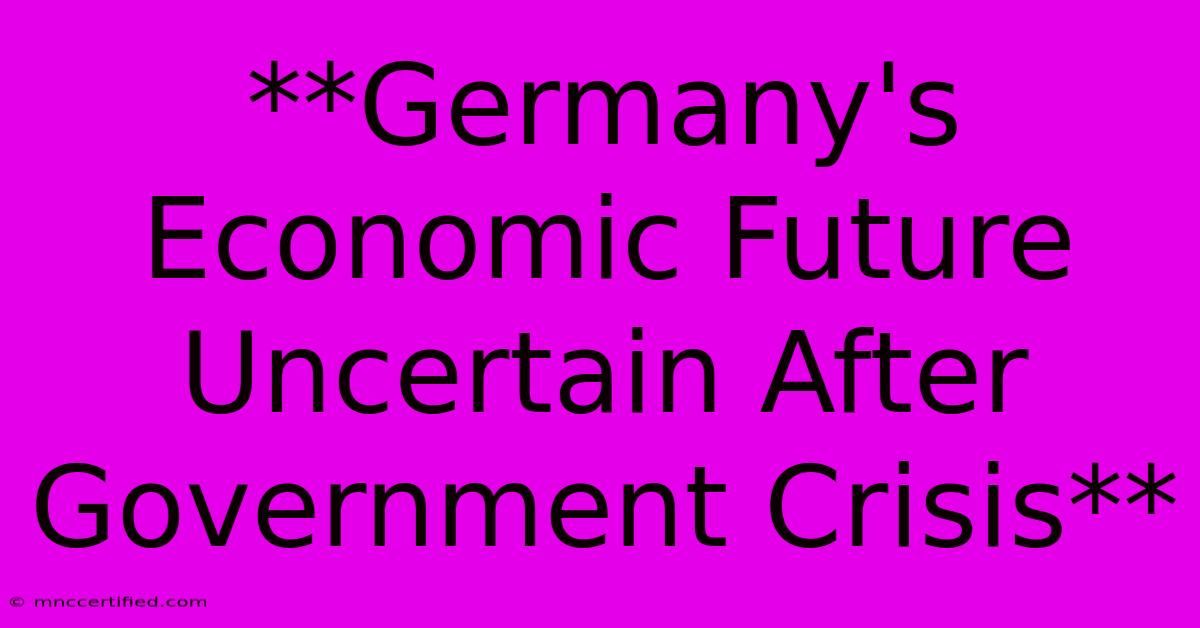**Germany's Economic Future Uncertain After Government Crisis**

Table of Contents
Germany's Economic Future Uncertain After Government Crisis
Germany, long considered the economic powerhouse of Europe, is facing a period of uncertainty following a recent government crisis. The resignation of Finance Minister Christian Lindner, coupled with ongoing political turmoil, has left many questioning the country's future economic prospects.
The Trigger: A Crisis of Confidence
The catalyst for the crisis was the failure of the German government to agree on a new budget. Lindner, the leader of the Free Democratic Party (FDP), resigned after his party's demands for increased spending cuts were rejected by the coalition partners, the Social Democrats (SPD) and the Greens.
This budget impasse, coupled with growing concerns over rising inflation and a potential recession, has shaken confidence in the government's ability to manage the economy.
The Economic Impact: A Looming Recession?
The current situation has sparked fears of a recession in Germany. The country is already grappling with soaring energy prices, supply chain disruptions, and the ongoing war in Ukraine.
Key Economic Indicators:
- Inflation: Germany is experiencing its highest inflation rate in decades, putting a strain on household budgets and squeezing consumer spending.
- Energy Prices: The reliance on Russian energy has made Germany particularly vulnerable to the global energy crisis, leading to skyrocketing gas prices and a surge in energy costs for businesses.
- Manufacturing Output: German manufacturing, a key sector of the economy, has been hit hard by rising costs and supply chain issues.
What Lies Ahead: Uncertainty and Challenges
The government's ability to navigate this economic storm will be crucial. The coalition's fractured state, combined with the lack of a clear budget plan, has led to a sense of instability.
Key Challenges:
- Finding Fiscal Consensus: The government needs to reach a consensus on the budget, balancing spending cuts with necessary investments in infrastructure and green technologies.
- Addressing Inflation: Tackling inflation will require a multi-pronged approach, including addressing energy prices, supporting vulnerable households, and potentially adopting a more interventionist fiscal policy.
- Strengthening the Economy: Maintaining competitiveness and fostering innovation will be essential for long-term economic growth.
The Global Impact: A Ripple Effect
Germany's economic struggles have implications beyond its borders. As Europe's largest economy, any slowdown in Germany's growth could have a ripple effect across the continent and even globally.
Possible Consequences:
- Reduced Trade: A weakening German economy could lead to reduced demand for goods and services from other countries, impacting global trade.
- Financial Instability: Uncertainty in Germany could affect the stability of European financial markets and the Eurozone.
- Geopolitical Tensions: Germany's economic vulnerabilities could further complicate its diplomatic efforts in addressing geopolitical challenges, such as the war in Ukraine.
Looking Ahead: A Need for Stability and Vision
The German government faces a critical moment. Swift and decisive action is required to restore confidence in the economy and navigate the numerous challenges ahead. This will require a unified approach, clear communication, and a long-term vision for economic growth.
The outcome of this crisis will have a significant impact on Germany's future. It will determine whether the country can maintain its position as a leading economic power in a rapidly changing world.

Thank you for visiting our website wich cover about **Germany's Economic Future Uncertain After Government Crisis** . We hope the information provided has been useful to you. Feel free to contact us if you have any questions or need further assistance. See you next time and dont miss to bookmark.
Featured Posts
-
Kirk Herbstreit Shares Loss Of Dog Ben
Nov 08, 2024
-
Charges Filed In Liam Paynes Passing
Nov 08, 2024
-
Where To Watch Ravens Thursday Night Football
Nov 08, 2024
-
Medical Malpractice Insurance In Florida
Nov 08, 2024
-
Fine Print Bond Mutual Fund Fact Sheet
Nov 08, 2024